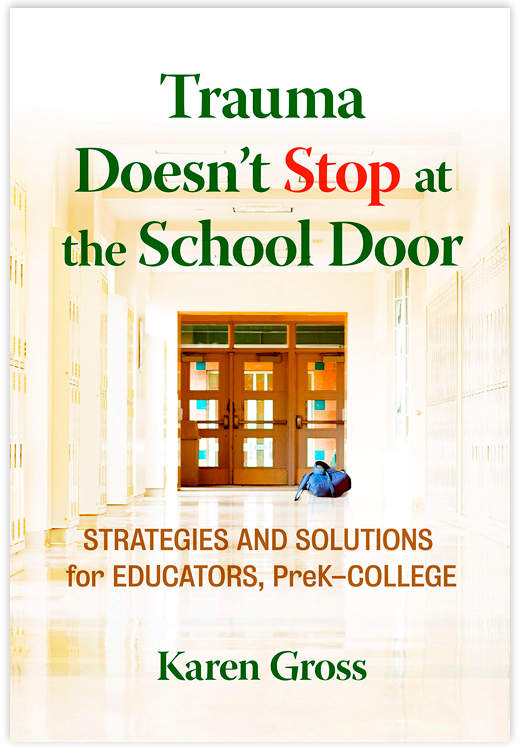Author
Educator
My work is focused on solutions to help students, educators, administrators and community members and their organizations/institutions thrive, not just survive.

My work is focused on solutions to help students, educators, administrators and community members and their organizations/institutions thrive, not just survive.

 Trauma Doesn’t Stop at the School Door:
Trauma Doesn’t Stop at the School Door: This book explores how educational institutions have failed to recognize and effectively address the symptoms of trauma in students of all ages. Given the prevalence of traumatic events in our world, Gross argues that it is time for educational institutions and those who work within them to change their approaches and responses to traumatic symptoms that manifest in students in schools and colleges.
These changes can alter how and what we teach, how we train teachers, how we structure our calendars and create our schedules, how we address student behavior and disciplinary issues, and how we design our physical space. Drawing on real-life examples and scenarios that will be familiar to educators, this resource provides concrete suggestions to assist institutions in becoming trauma-responsive environments, including replicable macro- and microchanges.
“Karen Gross has authored a remarkable book that paves the way for each of us to become trauma-responsive in our own lives and in the daily life and future of the schools, institutions, and communities in which we live and work. This book is both scholarly and practical, enabling us better to understand the research, evidence, and effects of trauma and the positive steps we can take to address its many impacts. She offers us extraordinary insights and solutions to build and sustain safe, thriving environments that can reduce both the frequency of traumatic incidents and traumatic stress on individuals and communities. The book is a treasure trove of ideas and strategies that teachers, parents, students, and leaders of any organization can leverage to make positive transformational changes across the nation.”
—Martha J. Kanter, Executive Director, College Promise Campaign; U.S. under secretary of education (2009–2013)
“Trauma Doesn’t Stop at the School Door is a treasure trove of information on trauma as well as thoughtful recommendations for schools, from pre–K through college, to counteract negative consequences of trauma in their students. Both very readable and comprehensive, the book contains big picture solutions, like re-designed school layouts, and is a gold mine of practical ideas for any educator to lessen trauma’s effect on learning. Dr. Gross utilizes her own experiences and those of others to unfold a convincing scenario for more effective schools in our trauma-affected era. I heartily recommend this book to today’s colleges of teacher education, as well as educators everywhere.”
—Kathleen Ross, President Emeritus and Professor of Cross-Cultural Communication, Heritage University
“This book is highly recommended to all educators and administrators who are interested in understanding the association of trauma and the autonomic nervous system as well as exploring strategies on policy, program, and practice in trauma-responsive education. It is a book for the ‘Generation T’ in the context of our time. The book offers strategies for quieting the hyper-aroused stress response system.”
—Ed K.S. Wang, M.S., Psy.D., Massachusetts General Hospital
“Most educators right now only know that trauma exists. But we don’t know what it looks like, how it impacts students, or how to help students find a pathway through it. So our response is to do little or nothing about it. No more. With Trauma Doesn’t Stop at the School Door, Dr. Gross helps educators and student advocates become trauma-aware and charts a course for teachers and schools to become trauma-responsive.”
—G. Gill Hunter, professor, Eastern Kentucky University
“Karen Gross gives her readers perspectives and resources that should be added to every teacher’s toolbox in order to move beyond the delivery of content and become more cognizant of obstacles that can affect learners under their charge. A must-read for anyone that practices the art of teaching.”
—Ivan Figueroa, educational consultant
“Applying the principles from Trauma Doesn’t Stop At the School Door, to my work as a teacher in a trauma sensitive elementary school, has transformed the way I think, plan, and teach my learners. Karen gives all educators the necessary tools to facilitate student success. Great read too. Couldn’t put it down.”
—Allyson Hoffman, Library Media Specialist, Molly Stark Elementary School, Bennington, VT
“My single comprehensive impression, carried through the entire book, was how I wish I’d read something like this many, many years ago. I would have been a better high school teacher, a better teacher of dyslexic students (my specialty), and a more attentive college administrator.”
—Will Wooton, Educational Consultant, Author and Former President of Sterling College
“Gross’s book is user-friendly and relatable. She provides supplemental resources throughout the book including her previous title, Breakaway Learners, which focuses on the successes of at-risk students who have developed what she terms lasticity (p. 16). Lasticity consists of five elements that facilitate and explain how students progress through the educational system despite barriers. She does this to demonstrate the contrast between those learners and the students described in this current book, and encourages readers to use them side by side. .” Click HERE to read the full review.
—Laurie Inman, Ph.D., is a university chair and lecturer at California State University Dominguez Hill